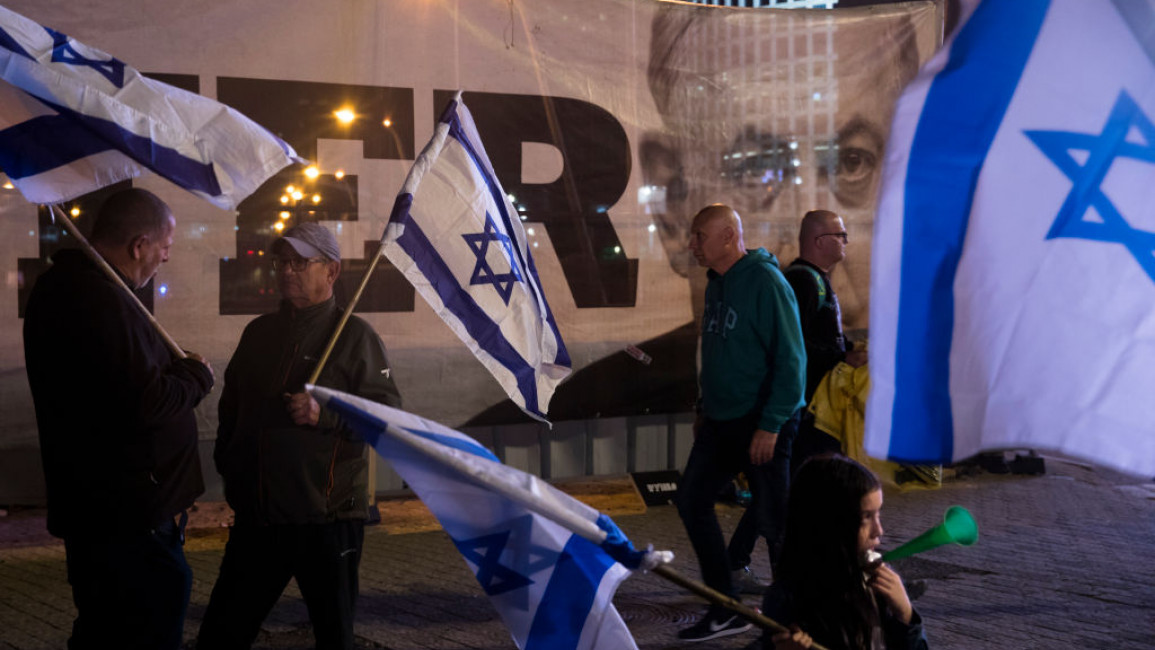Israelis protest against judicial reform bill ahead of key vote
Israelis protested Monday against the government's judicial reform bill which they say threatens democracy, as lawmakers ready for a key vote on the controversial overhaul put forward by Israel's far-right government.
Demonstrators from across Israel descended on Jerusalem to rally near parliament ahead of the first reading of legislation to change the way judges are picked.
"The state is in danger," said Dvir Bar, a 45-year-old demonstrator from Holon in central Israel.
"It's an attempted coup, to transform Israel into a dictatorship," he said in Jerusalem, as hundreds gathered hours ahead of the parliamentary session.
As demonstrators travelled to Jerusalem, some 4,000 parents, students and teachers also rallied in northern Tel Aviv, according to an AFP correspondent.
The sweeping judicial reform programme is a cornerstone of Prime Minister Benjamin Netanyahu's administration, an alliance with ultra-Orthodox and extreme-right parties which took office in late December.
The premier views the overhaul as key to restoring the balance between the branches of government, as he believes judges have too much power over elected officials.
But opponents argue the government is making a power grab and tens of thousands of protesters have gathered in Tel Aviv for seven consecutive weeks to protest the legislation.
In Jerusalem, protester Kovi Skier took aim at the government's plan to allow parliament to overrule any Supreme Court decision with a simple majority.
"If there's no judicial review, the government can make whatever policies it wants without any limitations," said the 33-year-old from the central city of Givat Shmuel.
"It could make policies against women, policies against Arabs, policies against the religious, it doesn't make a difference who. Everyone will be affected," he added, carrying his daughter who was clutching an Israeli flag.
Lawmakers are set to hold their first vote later Monday on measures to change the composition of the committee to select judges.
A bill to prevent judges from ruling against the so-called Basic Laws, Israel's quasi-constitution, is also on the parliamentary agenda.
Police said officers arrested eight demonstrators in the Tel Aviv area for breaching public order and disobeying instructions.
Netanyahu slammed protesters who delayed a member of the parliamentary justice committee, Tally Gotlib, from leaving after they gathered outside her home in central Israel.
"The demonstrators who talk about democracy are the ones who bring about the end of democracy when they prevent the public representatives from exercising the basic right in democracy -- to vote," Netanyahu wrote on Twitter on Monday.
The premier has expressed a willingness to talk to the opposition, but has vowed to press on with the legislation without delay.
President Isaac Herzog, who holds a largely ceremonial role, said he is "worried about what is happening in Israeli society" and views the situation as an existential crisis.
"We face a fateful test. I see the rifts and fissures between us, which are becoming deeper and more painful at this time," Herzog said Sunday.
The reform would give the government a de facto majority in the process to nominate judges.
Currently, top jurists are chosen by a panel overseen by the justice minister that includes judges, lawmakers and lawyers representing the Israeli Bar Association.
Under the proposals, the association's members would be removed and two "members of the public" would be named by Justice Minister Yariv Levin's office instead. Sitting judges would still be on the panel, as would another Israeli minister.
Israel's new government includes far-right figures including Finance Minister Bezalel Smotrich and National Security Minister Itamar Ben Gvir who both have sought to expand illegal settlements in the West Bank and have used "racist" rhetoric against Palestinians


![President Pezeshkian has denounced Israel's attacks on Lebanon [Getty]](/sites/default/files/styles/image_684x385/public/2173482924.jpeg?h=a5f2f23a&itok=q3evVtko)



 Follow the Middle East's top stories in English at The New Arab on Google News
Follow the Middle East's top stories in English at The New Arab on Google News


